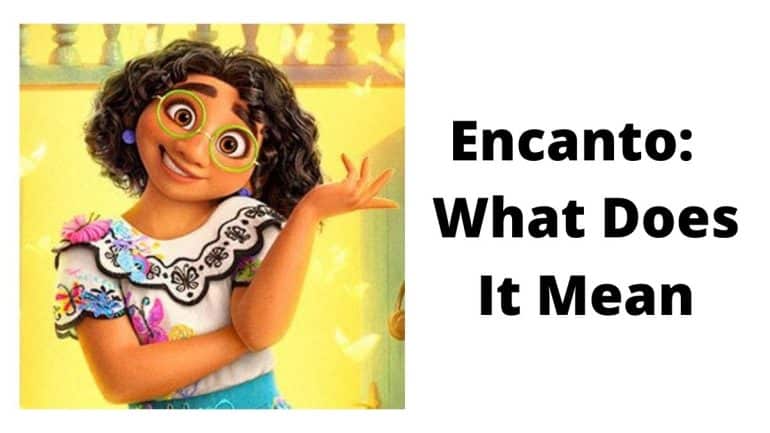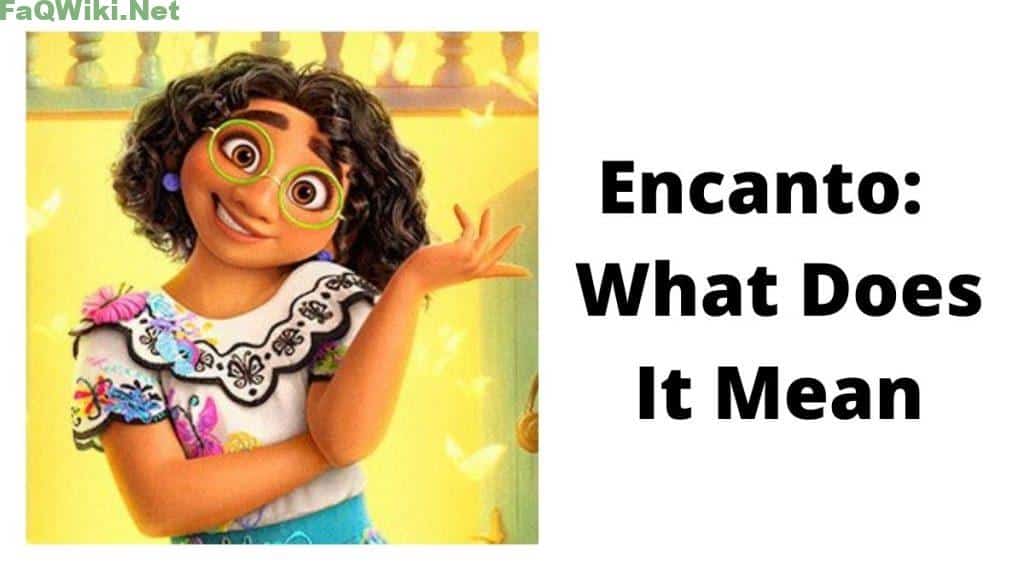Unraveling the Mysteries of “Encanto”: What Does it Mean?

Introduction
Encanto is a Spanish word that can be translated to mean “enchantment,” “charm,” or “magic.” It is a word that holds deep cultural significance in Latin America and is often used to describe something or someone with a special quality that captivates and inspires others.
In this article, we will explore the origin of Encanto, its multiple meanings and nuances, and its significance in Latin American culture. We will also answer frequently asked questions about Encanto, including how it differs from other similar concepts and whether it can have negative connotations. By the end of this article, you will have a better understanding of what Encanto means and why it is such an important part of Latin American culture.

Understanding the Origin of Encanto
The word Encanto has its roots in the Latin word “incantare,” which means “to enchant.” The word gradually made its way into the Spanish language and has been used in various contexts throughout history.
In Latin American culture, Encanto has been used to describe the captivating and mystical qualities of nature, music, and art. The concept of Encanto has deep roots in indigenous cultures, where it was associated with the spiritual world and the mystical powers of nature.
Over time, the meaning of Encanto has evolved to encompass a broader range of concepts, including the idea of charm, beauty, and elegance. Today, Encanto is often used to describe people, places, and events that have a certain magical quality that captures the imagination and inspires wonder.
Encanto is frequently used in literature and other forms of art, where it is employed to evoke a sense of enchantment and mystery. For example, the novel “One Hundred Years of Solitude” by Gabriel Garcia Marquez is full of references to Encanto, which is used to describe the magical realism that is woven into the fabric of the story. In music, Encanto is often used to describe the soulful and passionate quality of Latin American rhythms, such as salsa and tango.
In short, the origin of Encanto is deeply rooted in Latin American culture and has been used in various contexts throughout history to describe the mystical and enchanting qualities of nature, art, and human experience. The word has evolved over time to encompass a broader range of concepts, but its essence remains the same: the idea of capturing the imagination and inspiring wonder.
Interpreting the Multiple Meanings of Encanto
Encanto is a word with multiple meanings and nuances that can vary depending on the context in which it is used. While the word is often translated as “enchantment” or “charm,” it can also be used to describe a variety of other concepts.
For example, Encanto can be used to describe a person with a captivating personality or an alluring quality that draws others in. It can also be used to describe a place with a special charm or an event that is filled with magic and wonder. Additionally, Encanto can be used to describe a feeling of enchantment or a state of being captivated by something or someone.
Despite its similarities to other concepts such as charm, allure, and magic, Encanto has its own unique nuances that set it apart. Unlike charm, which can be more superficial and based on appearance, Encanto is often associated with a deeper, more meaningful connection between people or things. And while magic may imply a sense of mystery or the supernatural, Encanto can also be used to describe more mundane but still enchanting experiences.
In everyday conversations, Encanto can be used to describe a wide range of experiences and sensations. For example, one might use the word to describe the feeling of being captivated by a beautiful sunset or the charm of an old building in a historic city. It can also be used to describe a person who has a special quality that makes them stand out in a crowd.
Overall, Encanto is a versatile and nuanced word that can be used to describe a variety of concepts in different contexts. While it shares some similarities with other concepts such as charm and magic, it has its own unique essence that captures the imagination and inspires wonder.
Encanto in Latin American Culture
Encanto plays a significant role in Latin American culture, where it is deeply woven into the fabric of music, dance, literature, and other art forms. The concept of Encanto is closely tied to the idea of spirituality, which is an important part of Latin American culture.
In music and dance, Encanto is often used to describe the soulful and passionate qualities that are characteristic of Latin American rhythms such as salsa, tango, and samba. These rhythms are infused with a sense of enchantment and joy that captures the essence of Latin American culture.
In literature, Encanto is often used to describe the magical realism that is a hallmark of Latin American literature. Writers such as Gabriel Garcia Marquez and Isabel Allende use Encanto to evoke a sense of wonder and enchantment that is characteristic of the region.
The connection between Encanto and spirituality is also evident in many cultural practices and traditions. For example, the Day of the Dead festival, which is celebrated throughout Latin America, is rooted in the belief that the spirits of the dead return to the world of the living for a brief time. During this time, families gather to honor their ancestors and celebrate the cycle of life and death.
Encanto is also celebrated in many other cultural events and festivals throughout Latin America. For example, the Carnival of Barranquilla in Colombia is a colorful and vibrant celebration that is filled with music, dance, and other forms of artistic expression. The festival is rooted in the belief that life is a celebration, and it is an opportunity for people to come together and share in the joy of the moment.
Overall, Encanto is a deeply ingrained part of Latin American culture, where it is celebrated in music, dance, literature, and other art forms. It is a reflection of the region’s spirituality and the belief that life is a magical and enchanting experience. For Latin Americans, Encanto is not just a word, but a way of life that is deeply intertwined with their cultural identity.
FAQs
What is the difference between Encanto and other similar concepts, such as charm or magic?
While Encanto, charm, and magic may have some similarities, they are not interchangeable concepts. Charm refers to a quality that attracts people, while magic refers to the use of supernatural or mystical forces to achieve a desired outcome. Encanto, on the other hand, is a Spanish word that translates to “enchantment” or “magic,” but it is often used to describe the special qualities or aura that something or someone has that makes it unique and captivating.
Is Encanto used differently in different Spanish-speaking countries?
The meaning of Encanto can vary depending on the context and the region. In some countries, it may be used to describe a sense of mystery or enchantment, while in others it may be used to describe the charm or charisma of a person.
Can Encanto be negative?
Encanto is generally used in a positive sense to describe something that is captivating or enchanting. However, in some contexts, it can be used in a negative way to describe something that is deceptive or misleading.
Can a person have Encanto?
Yes, Encanto can be used to describe the unique qualities that a person has that make them captivating or enchanting. It can refer to a person’s charm, charisma, or other attractive qualities.
How is Encanto celebrated in Latin America?
Encanto is celebrated in a variety of ways throughout Latin America. It is often associated with music, dance, and other forms of art that capture the soulful and passionate qualities of the region. Encanto is also celebrated in many festivals and cultural events throughout Latin America, such as the Day of the Dead festival in Mexico and the Carnival of Barranquilla in Colombia.
What are some common phrases or expressions that use Encanto?
There are many common phrases and expressions that use Encanto in Spanish, such as “tener Encanto” (to have charm or charisma), “un lugar con Encanto” (a place with charm or enchantment), and “un Encanto de persona” (a captivating or enchanting person). These phrases are often used to describe something or someone that has a special quality that makes it unique and captivating.
Conclusion
In conclusion, Encanto is a multifaceted and culturally significant concept in Latin America. It has a rich history and evolution in meaning over time, and it is deeply woven into the region’s art, music, and spirituality. Through this article, we have explored the origin and multiple meanings of Encanto, as well as its significance in Latin American culture.
We learned that Encanto can be used to describe a variety of things, such as people, places, and events, and that it has nuanced differences from similar concepts like charm and magic. Additionally, we delved into how Encanto is celebrated in festivals and other cultural events throughout Latin America and explored some common phrases and expressions that use the word.
It is crucial to understand the meaning and significance of Encanto in Latin American culture to fully appreciate the region’s rich heritage and artistic expression. Encanto serves as a testament to the captivating and enchanting qualities of Latin America and its people. As such, it is a concept that deserves attention and recognition not only in the region but also worldwide.
